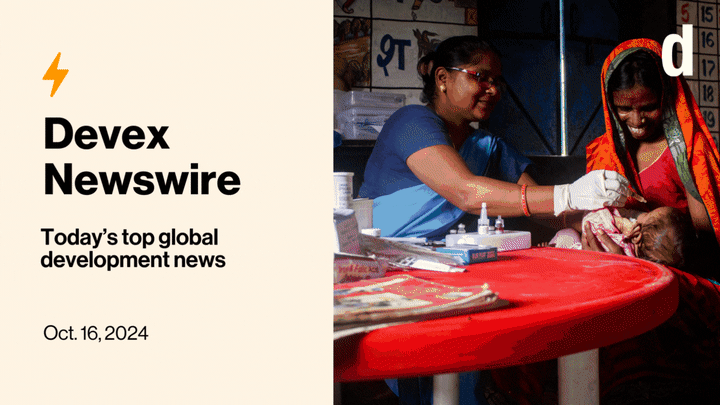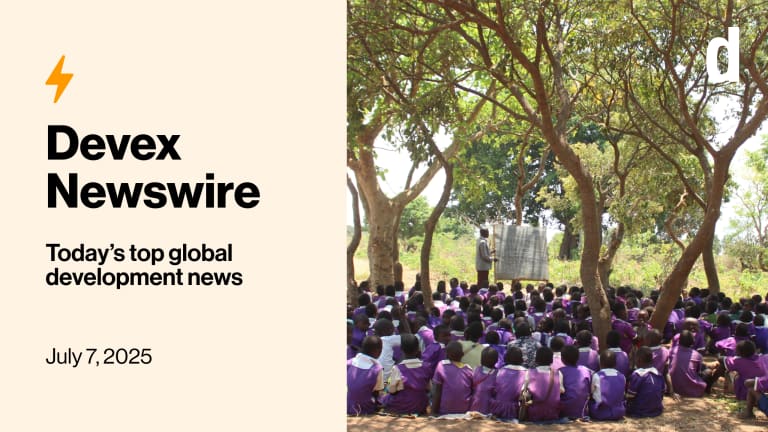
Khushi Baby is a big deal in rural India health care. Used by over 75,000 health workers, it tracks 45 million people, improving vaccination rates and reducing malnutrition.
Also in today’s edition: We look at the push for regional vaccines, microbiome research gaps, Crown Dependencies and secret funds, and clinching your first job in humanitarian aid.
+ Join us in Washington, D.C. on Oct. 24 for Devex World, our flagship summit to connect with globaldev leaders and luminaries, which is taking place alongside the World Bank annual meetings. You’ll get the opportunity to meet with leaders from the sector in person and ask them what’s on their mind. Get your tickets now.
Happy baby
This is a preview of Newswire
Sign up to this newsletter for an inside look at the biggest stories in global development, in your inbox daily.
A mobile app is revolutionizing rural health care in India by digitizing records and enabling real-time intervention for high-risk patients. Khushi Baby, a health-tech solution, equips community health workers with the tools they need to track and treat issues like maternal anemia, malnutrition, and missed vaccinations, significantly improving care delivery in remote regions.
Take the case of Leela, a pregnant farmworker in Rajasthan who collapsed after working through dizzy spells caused by severe anemia. Despite her condition, she hadn’t sought treatment, fearing the loss of a day's wages. But community health worker Bhomitra Sutar flagged her case in the Khushi Baby app, which marked her as high risk.
The app’s real-time data tracking allowed Sutar’s supervisors to monitor Leela’s condition, and after repeated follow-ups and the help of a field monitor, Leela finally received the iron injections she needed to recover, Sanket Jain writes for Devex.
“Khushi” means happiness in Hindi. Originally developed to address the country’s immunization gap, the app has evolved into a critical tool for rural health care, providing timely insights that ensure patients don’t slip through the cracks. Khushi Baby’s reach is vast, with over 75,000 health workers now using the app to digitize health care records for 45 million people across India. Its ability to track health risks in real time has improved vaccination rates, reduced malnutrition, and facilitated earlier intervention in high-risk pregnancies.
Despite the app’s success, challenges persist. Community health workers, known as ASHAs, face heavy workloads and low pay, often juggling multiple health programs and manual record-keeping. Khushi Baby is working with the government to streamline these processes, aiming to reduce paperwork and consolidate health tracking systems. The goal is not just to collect data but to empower ASHAs to act on it, driving meaningful improvements in health care outcomes across India’s most underserved communities.
Explore the visual story: How digital record keeping is strengthening community health care in India
+ This story is part of a Devex series on what’s working in global health, exploring successful initiatives, what challenges they encountered, as well as key lessons and insights for the sector.
To get in touch about the series, including pitches for us to consider, email editor@devex.com. These are editorially independent articles, supported with funding from the Gates Foundation.
The best shot at regional drugs
The push for regional vaccine and medicine manufacturing is a lasting lesson from the COVID-19 pandemic, with countries in the global south working to establish their own production capacities to avoid future supply delays, Andrew Green writes for Devex.
In Africa, several manufacturers are nearing large-scale production, but these facilities need to thrive in the long term. To do this, officials are focusing on strategies like coordinated procurement, pooled resources, and regional trade improvements. They also emphasize the need for sustainable supply chains, international collaboration, and health system strengthening to truly deliver equitable health care.
The Africa Centres for Disease Control and Prevention, for example, is coordinating with governments to ensure local manufacturers can access international markets and build a strong customer base through initiatives like preferential procurement. Latin America has seen production efforts falter in the past when manufacturers only catered to national needs. This highlights the importance of tapping into broader markets and international collaboration to avoid repeating these mistakes.
Another crucial aspect is supply chain, as countries must consider not only the medicines themselves but all the components needed for production, such as vials and packaging. Brazil has made local production a key issue during its presidency of the Group of 20 largest economies, recognizing that building a sustainable supply chain is essential.
Finally, it’s not just about manufacturing the products — it’s about delivering them effectively. Dr. Rosemary Mburu of WACI Health points out that strengthening health systems is essential to ensure vaccines and medicines reach the last mile and truly benefit those in need.
Read: Regional vaccine and drug production is coming. Can it survive?
ICYMI: CEPI-hosted collaborative to bridge regional vaccine manufacturing (Pro)
See also: The AU plans to pool resources to unify $50B pharma market (Pro)
+ Not yet a Devex Pro member? Start your 15-day free trial today to access all our expert analyses, insider insights, funding data, exclusive events, and more. Check out all the exclusive content available to you.
Mind the gap in African microbiome research
The new Microbial Interactions Laboratory at the University of Cape Town is setting out to increase the study of African microbiomes, which have long been underrepresented in global research. The lab brings together seven teams researching how microorganisms influence everything from HIV transmission to gastrointestinal disorders.
The initiative aims to go beyond documenting bacterial diversity to exploring how these bacteria interact with each other inside the human body and how this impacts health, Devex Senior Reporter Sara Jerving writes. Efforts also include setting up biobanks for local microbiome transplants and advancing treatments tailored to African populations.
One major focus is female reproductive health and how the vaginal microbiome impacts this — an underresearched area compared to gut microbiomes. Professor Jo-Ann Passmore, lead of the Vaginal Microbiome Research Consortium for Africa, emphasizes that while gut health thrives on bacterial diversity, a healthy vaginal microbiome is dominated by lactobacillus, and disruptions can lead to bacterial vaginosis, or BV, which can have serious health implications. BV causes inflammation which can increase the risk of contracting HIV, impact fertility, and can lead to complications in pregnancy.
The lab’s research is investigating how local strains of beneficial bacteria might better protect South African women from such conditions compared to bacteria found in the microbiomes of people abroad.
This work builds on the infrastructure of previous African initiatives like the Human Heredity and Health in Africa, or H3A, and aims to create a robust network of microbiome research across the continent. By focusing on regional health solutions, the lab hopes to foster a better understanding of how geography, local diets, environment, and genetic factors shape microbiomes and how they can be leveraged to improve health outcomes in Africa.
Read: New laboratory aims to expand microbiome research in Africa
Getting a foot in the door
Breaking into the humanitarian field can be challenging. Here’s how to improve your chances:
First, ensure you have the right skills and relevant experience. If you lack direct experience, consider volunteer programs or starting with domestic nonprofits that have international programs.
Also, don’t limit yourself to big-name organizations — smaller, lesser-known NGOs can provide valuable entry points. Be open to working in remote or difficult locations, as this increases your odds.
Lastly, network, network, network. Informational interviews can open doors and help you find champions who will advocate for you. Keep at it!
Read: How to get your first international job in humanitarian aid (Career)
+ Start your 15-day free trial of a Devex Career Account membership today to unlock all our exclusive career resources and get full access to the world’s largest global development job board.
Royal connections and corruption
The U.K.’s Crown Dependencies — Jersey, Guernsey, and the Isle of Man — have been accused of using their royal connections to block transparency efforts aimed at tackling dirty money. Andrew Mitchell, former U.K. development minister, claims these territories are resisting pressure to create public ownership registers that would expose illicit funds from corrupt politicians and warlords.
While some territories have made promises, Mitchell says they’ve gone back on their word, leveraging their links to the monarchy for protection. Despite fears of financial losses, he insists that cleaning up their act would still attract legitimate international investment, writes U.K. correspondent Rob Merrick.
Mitchell argues that if these territories wish to share the U.K.’s monarchy, flag, and values, they must also adopt stricter measures to combat corruption and money laundering. U.K. Foreign Secretary David Lammy is preparing a crackdown on kleptocracy, aiming to close the loopholes that allow corrupt leaders to stash stolen wealth. Offshore registrations provide significant revenue for territories like the British Virgin Islands, making reform challenging, but advocates insist transparency is essential.
Read: Former UK development minister claims tax havens use royal connections
In other news
The World Bank has voted on a major policy shift that unlocks $30 billion in additional lending over the next decade to help low- and middle-income countries tackle climate change and other global challenges. [Reuters]
A UNICEF official warned that more than 400,000 Lebanese children have been displaced in the past three weeks, raising fears of a “lost generation” as the country faces multiple crises and war. [AP]
Germany unveils revised asylum and security measures in its new “security package” after facing widespread criticism. [DW]
Sign up to Newswire for an inside look at the biggest stories in global development.




